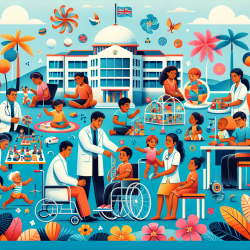As a practitioner dedicated to improving outcomes for children with neurodevelopmental disabilities (NDDs), it is crucial to stay informed about innovative approaches and evidence-based practices. The research article titled Strengthening Health Systems to Support Children with Neurodevelopmental Disabilities in Fiji—A Commentary offers valuable insights into how health systems can be strengthened to support children with NDDs, particularly in low- and middle-income countries (LMICs) like Fiji.
Here are key takeaways from the research and practical steps you can implement in your practice:
1. Collaborative Model of Care
The study highlights a decade-long collaboration between Fijian pediatric services and Australian developmental pediatricians. This partnership has resulted in a tiered model of care that includes:
- Early identification through community nurses using the Fijian Maternal Child Health Card.
- Comprehensive diagnostic assessments using standardized tools such as the Ages and Stages Questionnaire (ASQ) and the Childhood Autism Rating Scale (CARS).
- Referral pathways for early intervention and educational support.
As a practitioner, consider forming partnerships with local and international experts to enhance your diagnostic and intervention capabilities.
2. Training and Capacity Building
One of the significant outcomes of the Fiji model is the training of local pediatric trainees. Since 2010, 15 local and regional pediatric trainees have been trained, with two leading regular developmental clinics. This approach ensures sustainability and continuity of care.
Invest in continuous professional development and training programs for your team. Encourage participation in workshops, conferences, and collaborative projects to build a robust knowledge base.
3. Early Intervention Services
The research underscores the importance of early intervention services. In Fiji, key services include the physiotherapy department at Colonial War Memorial Hospital and the Frank Hilton Organisation, which provides play-based therapy groups and individual family service plans.
In your practice, prioritize early intervention by developing referral networks with local early intervention centers and specialists. Ensure that children receive timely and appropriate support to optimize their developmental outcomes.
4. Embedding Research in Practice
The Fijian model emphasizes the integration of research into clinical practice. Recent studies have provided valuable data on neurodevelopmental outcomes, informing service improvements and pilot programs like "Toso Vata" (Moving Together), an early intervention program for children with cerebral palsy.
Engage in research activities to build an evidence base for your interventions. Collaborate with academic institutions and research organizations to conduct studies that can inform and refine your practice.
5. Addressing Challenges
The research identifies several challenges, including limited human resources, appropriate diagnostic tools, and access to early intervention services. Addressing these challenges requires innovative solutions and ongoing collaboration.
Consider adopting feasible and culturally appropriate diagnostic tools. Strengthen community-based identification and referral systems. Advocate for policies that support the training and retention of pediatric specialists and allied health professionals.
In conclusion, the collaborative model of care in Fiji offers a valuable blueprint for strengthening health systems to support children with NDDs. By implementing these evidence-based practices, you can enhance the quality of care and improve outcomes for children in your community.
To read the original research paper, please follow this link: Strengthening Health Systems to Support Children with Neurodevelopmental Disabilities in Fiji—A Commentary.










